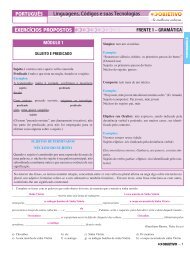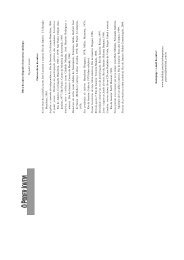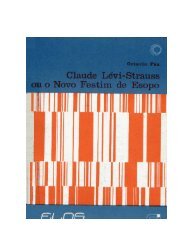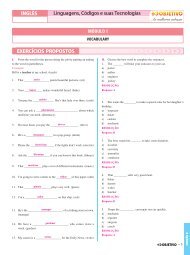1 - No-IP
1 - No-IP
1 - No-IP
Create successful ePaper yourself
Turn your PDF publications into a flip-book with our unique Google optimized e-Paper software.
Simple Present Tense<br />
Usos:<br />
• ações habituais com advérbios, tais como: always,<br />
often, frequently, seldom, rarely, usually, sometimes,<br />
never e com certas expressões, tais como on Mondays<br />
(Sundays etc.), once a day, (week, month etc.), everyday<br />
(week, month etc.), as a rule, now and then.<br />
Exemplos:<br />
They rarely visit their grandparents.<br />
<br />
She often drinks tea.<br />
<br />
• após expressões de tempo (till, until, before, after,<br />
as soon as, as long as, when, by the time, whenever,<br />
while).<br />
Exemplos:<br />
I’ll be here as soon as he arrives.<br />
<br />
Wait here till the rain stops.<br />
• após in case<br />
Exemplo:<br />
<br />
Take your coat with you in case it gets cold.<br />
OBSERVAÇÕES<br />
1<br />
I work<br />
you work<br />
he, she, it works<br />
Infinitive (– to)<br />
we work<br />
you work<br />
they work<br />
<br />
Todos os verbos, exceto os modais (anômalos), recebem<br />
o acréscimo de –s nas suas formas de 3. as pessoas do<br />
singular.<br />
MÓDULO 6<br />
GRAMMAR – PRESENT TENSES<br />
Exemplos:<br />
John likeS pop music.<br />
My neighbor singS very badly.<br />
2<br />
Os verbos terminados em –ss, –ch, –sh, –o, –x e –z<br />
recebem o acréscimo de –es e não apenas –s.<br />
Exemplos:<br />
miss → missES<br />
teach → teachES<br />
brush → brushES<br />
do → doES<br />
fix → fixES<br />
buzz → buzzES<br />
3<br />
Os verbos terminados em –y perdem o –y e recebem o<br />
acréscimo de –ies quando o –y aparecer depois de uma<br />
consoante. Caso contrário, recebem apenas –s.<br />
Exemplos:<br />
defy → defIES obey → obeyS<br />
fly → flIES say → sayS<br />
ATENÇÃO<br />
• each, every, everybody, everyone, somebody,<br />
someone, nobody, no one, anybody, anyone, something,<br />
much e little são considerados 3. as pessoas do singular.<br />
Exemplos:<br />
Everybody loves John.<br />
<br />
<strong>No</strong>body understands Jane.<br />
<br />
• many, few, several e alguns coletivos são conside -<br />
rados 3. as pessoas do plural.<br />
Exemplos:<br />
Many don’t believe her.<br />
<br />
The cattle are lowing in the barn.<br />
<br />
– 15 INGLÊS E









